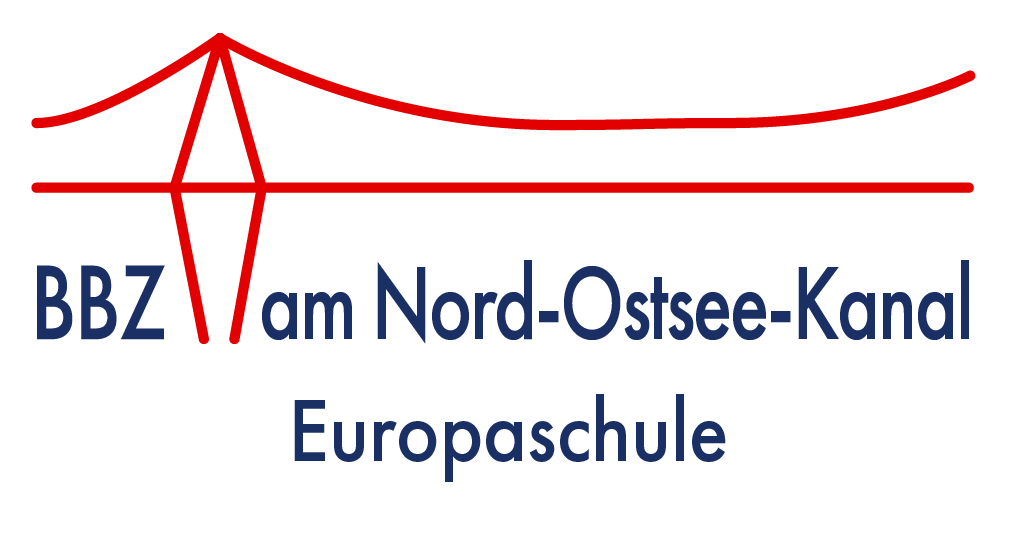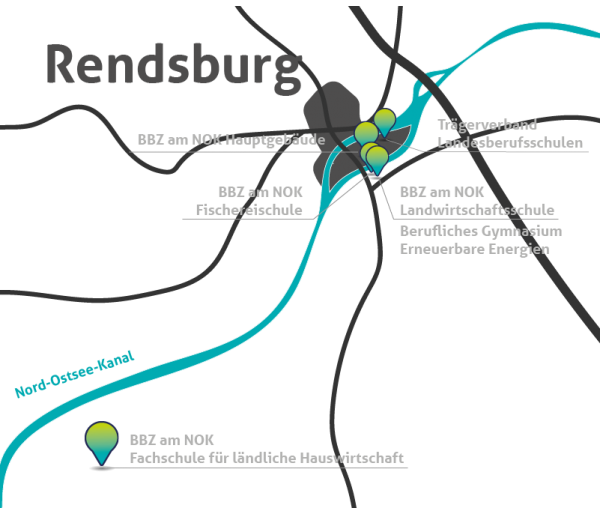Dual training (AbBi)
As a partner in the dual vocational training scheme, the vocational school provides its students with both a specialised and a general education. It includes a broad basic education and takes account of the requirements of professional training and professional practice. The teaching is mainly organised in such a way that students in the first year of training (basic level) have lessons two days a week but only one day a week during the second, third and, if applicable, fourth year of training (specialist levels). For some courses, the lessons are organised in a block.
Occupational areas at the BBZ on the Kiel Canal
Training is provided for approximately 45 different occupations in the following areas:
Plant and Air Conditioning Technology Department
As part of the dual vocational training programme, students are trained in four technical supply occupations in the plant and air conditioning technology department at the BBZ on the Kiel Canal. These are system mechanics, plumbing, technical system planning and mechatronics for refrigeration technology. The teaching focuses on imparting skills relevant to the job in a hands-on way. The main emphasis is on conveying supply-related content, which is taught using state-of-the-art technology in the classroom and in laboratories. A high level of technical expertise and methodological diversity are features of the teaching for all four occupations.
The Construction Technology Department is divided into building construction and public works. In building construction, trainee draughtsmen, woodwork & structural protection technicians, bricklayers, reinforced concrete workers and carpenters are taught in blocks of lessons. This means that the trainees come to the BBZ on the Kiel Canal for 3 weeks to learn about the technical or methodological aspects of actual situations that may occur in their chosen occupation. They then go off to their training companies before returning to us for a block of lessons.
Public works deals with the building/redevelopment of roads and car parks and the positioning of water channels/sewers and other supply lines. During their 2- or 3-year training course, students learn all the theoretical content with a view to putting it into practice correctly in the work environment. The job of road maintenance worker involves maintaining and taking care of the infrastructure. This could be, for example, maintaining roadsides or clearing the roads in winter.
In all areas of construction technology, digitisation is playing an increasingly important role with, for example, machines such as wheel loaders, graders or asphalt pavers on building sites making increasing use of GPS systems. In addition, complete documentation of a project can be assured by using drones to document or calculate invoices for construction sites.
At the specialist college for construction technology, skilled workers can acquire the highest vocational qualification offered by a vocational school. To do so, they have to work in the field for a year after completing their training and can then spend two years at the specialist college for construction technology, studying to become a technician. Technicians in the construction industry often take on a managerial role and independently supervise various construction sites.
As part of the dual vocational training programme, students are trained for occupations in electrical and information technology in the Electrical Engineering Department of the BBZ on the Kiel Canal. In the field of electrical engineering, students are trained to become electrical technicians in energy and building technology, system integration and operating technology, and, in the field of information technology, they are trained to become IT electronics technicians or to work in industrial IT occupations.
Depending on the occupation, teaching takes place either on individual days or in a block, the latter with some residential placements. The teaching focuses on imparting skills relevant to the job in a hands-on way. The main emphasis is on conveying electrical and information technology content, which is taught using modern technology in the classroom and in laboratories.
In addition to the curriculum content, the trainees are offered a wide range of options during their training, such as visits to companies and trade fairs, public speaking seminars, Erasmus+ internships abroad and industry certificates (e.g., CISCO-CCNA).
In the Metals Technology Department, students are trained in numerous occupations with a wide variety of disciplines as part of the dual vocational training programme. These include the occupations of automotive mechatronics technician, agricultural and construction machinery mechatronics technician, bodywork and vehicle construction mechanic and industrial mechanic. In addition to the curriculum content, the trainees are offered a wide range of options during their training, such as visits to companies and trade fairs, sports activities, Erasmus+ internships abroad, 3D construction and printing, etc.
Department of Food and Creative Professions
The Department of Food and Creative Professions is made up of specialist groups in colour technology, personal care and nutrition, as well as interior design and saddlery/upholstery. Students are trained to become, for example, painters & decorators, hair stylists, butchers, bakers and salespersons. The curriculum content is implemented in the best possible way with an appropriate and practice-oriented learning environment and suitable premises. Support from state-of-the-art media technology and digitisation throughout the school promotes successful teaching and learning.
The specialist college for rural housekeeping, based in Hanerau-Hademarschen, operates according to the maxim of “learning by doing”. The students run as a company a residential centre and a school. In doing so, they acquire the basic theoretical principles in class and then put them into practice. At the specialist college, the students acquire the next highest qualification to a degree, in this case a qualification as a works manager.
In timber processing technology, students are trained for two wood and plastic processing occupations as part of the dual vocational training programme at the BBZ on the Kiel Canal. These are the occupations of small-scale carpenter and industrial woodworking mechanic.
Vocational school teaching imparts skills relevant to the job in a hands-on way. The following professional skills are included in the curriculum:
- Drafting and creating products according to design and function
- Selecting wood and wood-based materials according to purpose and economic efficiency
- Manufacturing parts from wood and wood-based materials by hand and using machines
- Assembling of parts into products
- Working with veneers, plastics, metals, glass and auxiliary materials
- Setting up, operating and maintaining machines, machine tools, systems and devices - Setting up, operating and maintaining pneumatic, hydraulic and electronic devices and equipment
- Refining surfaces
- Installing ready-to-fit parts and products
The course content includes ecological and economic considerations. Essential components of vocational school lessons are digital media and technologies (Internet, CAD, CNC etc.)
The Agriculture Department consists of the Farming, Housekeeping and Fisheries schools. Training takes place at the Osterrönfeld and Hanerau-Hademarschen sites.
As part of the dual training programme, students are trained to become farmers, agricultural service specialists and fish farmers. Also within the department are the one- and two-year specialist college for agriculture and the technical college for farming , both of which are full-time schools. Teaching is carried out in close cooperation with other agricultural institutions based at the “Grüner Kamp” in Osterrönfeld, such as the Schleswig-Holstein Chamber of Agriculture, Deula GmbH and Kiel University of Applied Sciences Department of Agriculture, as well as various professional associations and advisory groups.





